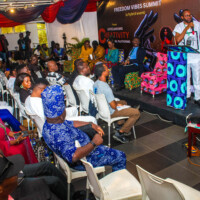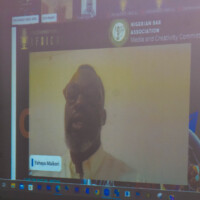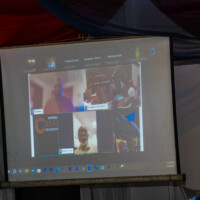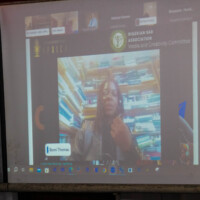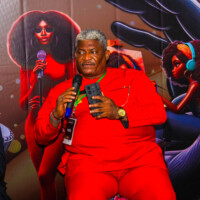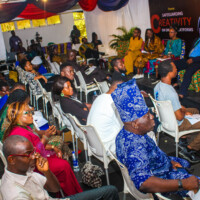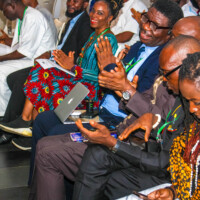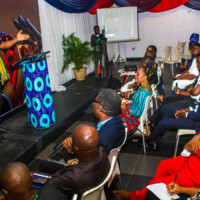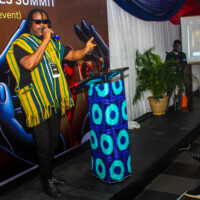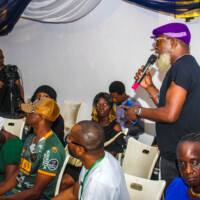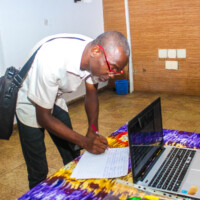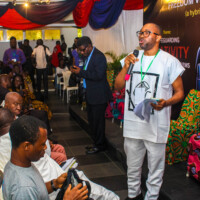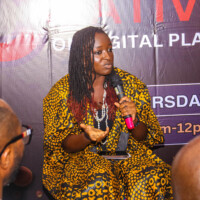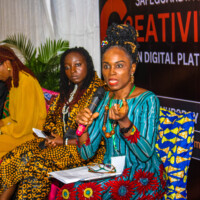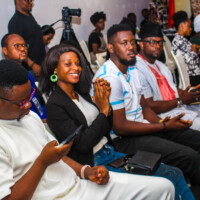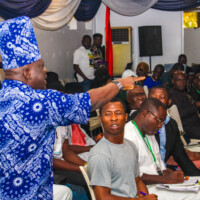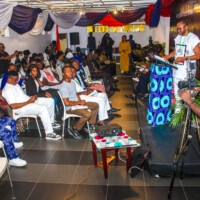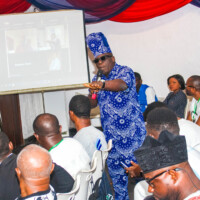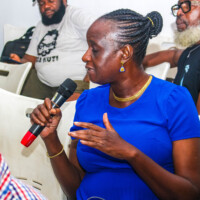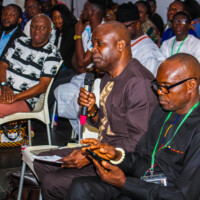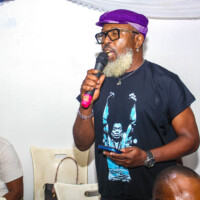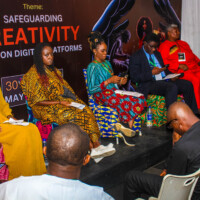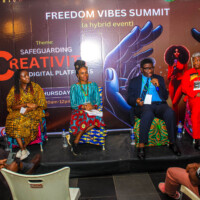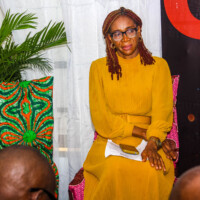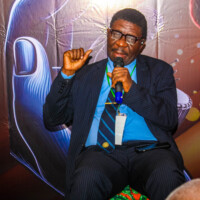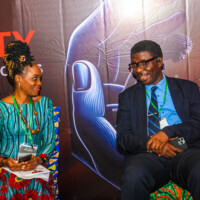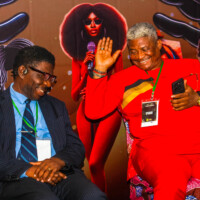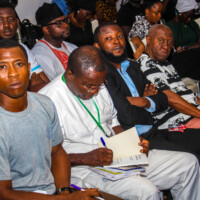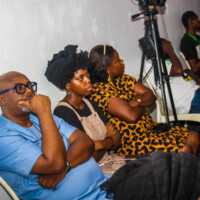
INTRODUCTION
On Thursday, 30th May 2024, Unchained Vibes Africa in collaboration with the Nigerian Bar Association’s Media and Creativity Committee, hosted the Freedom Vibes Summit on the theme “Safeguarding Creativity on Digital Platforms”. It was a hybrid event with most delegates physically in attendance at the Freedom Park in Lagos while others participated virtually via Zoom webinar. The event was attended by delegates from across Nigeria and beyond, representing various fields of the creative sector, civil society organizations (CSOs) and relevant government agencies. Stakeholders in attendance included filmmakers, skit makers, lawyers, musicians, actors, content creators, representative of the police and other government officials. The theme inspired robust dialogues and wholesome debates among stakeholders. Deliberations centred on the recent enforcement of policies, regulations and laws restricting satires and artistic expressions that depict Nigerian security and law enforcement agencies. There were also discussions on the recent pronouncement by the National Film and Videos Censors Board (NFVCB) with regards to a new regulation that would restrict smoking and ritual scenes in movies, skits and music videos. The artistic community was represented by the National President, Directors Guild of Nigeria (DGN) and Chairman of the Federation of Nollywood Guilds and Associations, Dr Victor Okhai; National President, Screenwriters Guild of Nigeria Yinka Ogun, Executive Program Director, Culture Advocates Caucus, Jahman Anikulapo and the representative of the Association of Nigerian Theatre Arts Practitioners (ANTP) Teju Agunlejika. There were veteran actors such as Norbert Young, Tunji Sotimirin, Francis Onwochei and Sam Uche Anyamele; music icons Eedris Abdulkareem and Myke Pam; Nigerian-Scottish multidisciplinary artist Bumi Thomas; voice actor Ehi Omokhuale, radio personality DJ Raymond Bola Browne; spoken word poet Torpedo Mascaw, award-winning theatre director Kenneth Uphopho and Nigeria’s fast rising poet and musician Ruth Mahogany, among others. The CSOs delegation included members of the Nigerian Bar Association (NBA) led by the Chairman of its Media and Creativity Committee, Yahaya Maikori, international human rights lawyer Kola Alapinni, former chairman of NBA Abuja branch Folarin Aluko, Damilola Alabi and Justice Segun Ojienoh. Other key CSO stakeholders included the President, FOM Foundation Eugene C. Oyibo; Founder, Elixir Trust Foundation, Emmanuel Ikule; broadcast journalist, educator and public affairs analyst Adeniyi Kunnu; investigative journalist and activist Ejiro Umukoro, and journalists from Arise TV, The Nation and Guardian newspapers. There were other CSO delegates from the human rights community who attended both physically and virtually. SP Benjamin Hundeyin, Police Public Relations Officer (PPRO) for Lagos, represented the Nigeria Police Force while the Executive Director/CEO of the National Film and Videos Censors Board (NFVCB) Dr Shaibu Husseini was represented by Barrister Uju Emagha, Regional Coordinator for Lagos. The Special Assistant to the President on Justice Sector Reform, ICT/Digital and Innovative Technology Marcus Obiene Fernandez and representatives of the National Human Rights were also in attendance. Stakeholders examined the threats to artists’ creativity and freedom of expression on digital platforms as detailed in this communique.CONCERNS
- Members of the artistic community raised concerns about the recent enforcement of a ban on the use of uniforms of law enforcement and security agencies in movies and skits. According to the Police, it is illegal under Section 251 of the Nigerian Criminal Code and Section 133 of the Penal Code to use police uniforms in movies and skits without permission. The police also claimed that wrong portrayal of the police institution undermines the integrity of the force and dampens the morale of its personnel. In its press statements, the police stated that permission is required before the portrayal, failure of which might lead to arrest and prosecution of the artist(s) involved. Other security and law enforcement agencies such as the Economic and Financial Crimes Commission (EFCC), the National Drug Law Enforcement Agency (NDLEA) and Lagos State Traffic Management Authority (LASTMA) have since released similar statements and threatened to prosecute artists who use their operational identities and portray them in bad light. These threats have created fear in the minds of many artists who want to use their works to criticize authorities, demand accountability and correct the ills in the Nigerian society
- Members of the artistic community were concerned about the federal government’s alleged ban on scenes depicting smoking, ritual killing and other acts in movies, skits, and music videos. Stakeholders believe such a policy amounts to censorship and undue restriction of artists’ ability to tell a story where such depictions are necessary
- The Nigeria Police was concerned about prank masters and skit makers whose activities are deemed ‘‘dangerous pranks’’ which may lead to unlawful activities that can endanger the lives of people or subject them to dehumanization
- Most stakeholders raised concerns about some skit makers’ practice of casting children and minors or exposing under-aged persons to sex scenes in skits or movies
OBSERVATIONS
- NBA lawyers, in their legal opinions, argued that there are exceptions to the issue of unlawful wearing of uniforms of security and law enforcement agencies under Section 110 (2) of the same Criminal Code and Section 79 (2) of the Criminal Law of Lagos State cited by the Police and LASTMA respectively. The proviso ‘‘This section shall not apply to the wearing of any uniform or dress in the course of a stage play or in any bona fide public entertainment’’ was highlighted
- The Police argued and insisted that Section 251 of the Criminal Code and Section 169 of the Criminal Law of Lagos State, both of which relate to ‘‘bringing contempt on the uniforms’’ and which have no provisos, are the laws they rely on and would continue to enforce them unless amended
- Other lawyers observed that the Criminal Code, which was applicable to old Southern states of Nigeria, is no longer applicable in states such as Lagos which have internalized and created their own criminal laws
- NBA lawyers observed that all the laws cited are subject to the provisions of the constitution and the power to interpret laws lies with the judiciary and not the police or the executive
- While some veteran actors and filmmakers acknowledged that the police had been cooperative in the past and shared their experiences enjoying the support of the police making available props in their productions, majority of filmmakers in attendance lamented the absence of a transparent, corruption-free, simplified, efficient and timely authorization process for the use of real police uniform and equipment
- The NBA Media and Creativity Committee re-affirmed its commitment to safeguarding artistic freedom in Nigeria. The Committee believes that the exemptions provided under the law means what it says, and says what it means. Artistes do not require ANY permission from the law enforcement agencies to wear uniforms in Nigeria in the course of their work. It is a misnomer and amounts to turning the Law on its head when the police says it is a mockery of them. The NBA Media and Creativity Committee would provide pro bono legal services if artistes are at risk in the course of exercising their right under this exemption and the Committee is not averse to testing the Law all the way to the apex court.
- The NFVCB clarified that the proposed new regulation was not a ban on smoking and ritual scenes but a restriction and additional requirement to include the prescribed health warnings on the screen whenever it is necessary to depict such scenes
- Stakeholders observed that the word ‘’censors’’ in the official name of National Film and Video Censors Board, remained a sign of lack of political will on the part of government to transition from censorship to classification despite several advocacy efforts demanding the renaming of the agency
- Members of the artistic community asserted that there are real issues of corruption, bad governance and other societal vices that traumatize citizens and inspire artists to reflect these realities through their works to catalyze change
- The police, as well as other security and law enforcement agencies, should implement internal reforms and improve their personnel’s welfare to alleviate the scale of misconduct which are well documented via video evidences that abound on the internet which inspire the satires by artists through their movies and skits
- Artists should always be peaceful and civil when challenging policies and laws that hinder their artistic freedom
- Security and law enforcement agencies should begin to learn what they don’t know about artistic freedom, so that they don’t fear what they don’t understand and clamp down on it
- The police and other security agencies should put in place a transparent, simplified, efficient and timely authorization process for artists who need to use the real uniforms and related props in their productions
- Artists should familiarize themselves with laws that impact their works, understand their rights, responsibilities and limitations
- More stakeholders meetings should be convened to address the conflicts between artists and security agencies to improve the relationship
- The NFVCB should intensify its engagement with the national assembly to accelerate the amendment of the NFVCB Act and its transition from a censorship body to a classification board. The renaming of the board from ‘‘Censors Board’’ to ‘‘Classification Board’’ should be a top priority in order to open up the space for robust engagements and earn the trust of practitioners
RECOMMENDATIONS
In the light of the foregoing therefore, the summit thus resolved and recommended the following:Ayodele Ganiu
Executive Producer
Unchained Vibes Africa
Yahaya Maikori
Chairman
NBA Media and Creativity Committee
Unchained Vibes Africa (UVA)
Unchained Vibes Africa (UVA) is a cultural organization and social enterprise committed to developing arts and culture projects geared towards social causes. Our mission is to leverage the power of the arts for civic education and to promote human rights, cultural diversity, and the spirit of solidarity in Africa. UVA’s flagship programme, Freedom Vibes is a series of events and shows designed to advocate for artistic freedom and promote civic engagements through arts. UVA has organized 8 editions of Freedom Vibes Series and a summit where it brought together stakeholders for dialogue and engagements towards participatory reforms in policies that hinder artistic freedom.
For more information about Unchained Vibes Africa, please visit our website www.unchainedvibesafrica.com
NBA Media and Creativity Committee
The Nigerian Bar Association (NBA) is the non-profit, umbrella professional association of all lawyers admitted to the Bar in Nigeria and a member of all statutory bodies that regulate the Nigerian Bar and Bench. The Media and Creativity Committee is the arm of the NBA executing its agenda on this thematic area. The NBA is Nigeria’s foremost and oldest professional membership organization and one of Africa’s most influential network of legal practitioners, with over 140,000 lawyers on its roll in 128 active branches across the 36 States and the Federal Capital Territory of Nigeria. It is organized into three practice Sections, eleven Fora, and two Institutes, all supported by one National Secretariat.
The NBA is engaged in the promotion and protection of human rights, the rule of law and good governance in Nigeria. It has an observer status with the African Commission on Human and People’s Rights, and a working partnership with many national and international governmental and non-governmental organisations concerned with human rights, the rule of law and good governance in Nigeria and across the world.
For more information about NBA, please see https://nigerianbar.org.ng/about


